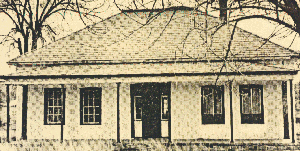Fort Apache Historic Park
 On May 16, 1870, an army post was established
near the present town of Whiteriver in order to assist the White Mountain
Apache Tribe to peacefully protect their lands. That same month, the post and
surrounding area was designated as a reservation for the tribe. On May 16, 1870, an army post was established
near the present town of Whiteriver in order to assist the White Mountain
Apache Tribe to peacefully protect their lands. That same month, the post and
surrounding area was designated as a reservation for the tribe.
Located in the heart of Apache country, Fort Apache was an
isolated outpost of Anglo expansion. Today it recalls a turbulent period of
both conflict and cooperation between representatives of the United States and
the various bands of the Western Apaches.
Fort Apache is perhaps most widely recognized in association with
the famous renegade leaders from various Apache bands, such as Geronimo and
Cochise, who were pursued by the soldiers from Fort Apache and the White
Mountain Apache Scouts, including Chiefs Alchise and Diable. It was these men
who were instrumental in bringing a lasting peace to the Southwest.
Today, visitors may stroll through old Fort Apache with the aid
of a self-guided walking tour or a guided tour. Over twenty buildings dating
from the 1870's through the 1930's comprise the 288-acre historic site. Also
located on the premises are prehistoric ruins, prehistoric and historic
petroglyphs, the old military cemetary, the Apache Culture Center, and a
recreated Apache Village.
Fort Apache is owned by the White Mountain Apache Tribe. It is
listed on the National Register of Historic Places. Fort Apache is situated
four miles south of Whiteriver, Arizona (headquarters of the White Mountain
Apache Tribe.) To get to Fort Apache, take State Highway 73 east from Carrizo
or south from Pinetop. The Fort is approximately 22 miles from the
turnoff.
Culture Center Visiting Hours
Monday - Saturday: 8:00 a.m. to 5:00 p.m.
June
- August.
Winter - Monday - Friday: 8:00 a.m. to 5:00 p.m.
Sunday:
Closed
For information call (928) 338-4625
Closed On All Major
Holidays.
Walking Tours and Apache Village
Call for information: The Office of Tourism (928)
338-1230
Fort Apache Historic
Park
P.O. Box 628
Fort Apache, Arizona 85926
(928)
338-1392
|

